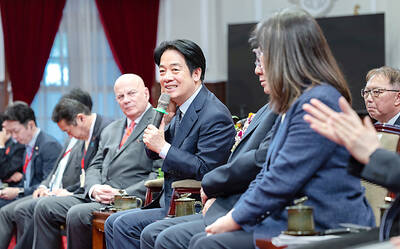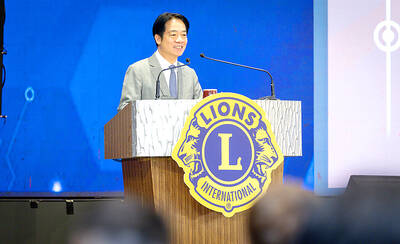Citing a survey that suggests nearly 80 percent of Taiwanese are opposed to ultimate unification with China, President Chen Shui-bian (陳水扁) yesterday said that ceasing the activity of the National Unification Council (NUC) and unification guidelines was in line with public opinion.
Chen made the remarks during an interview with Japan's Yomiuri Shimbun daily on Friday. He cited a recent public opinion poll as saying that those who support ultimate unification with China are in a minority in Taiwan.
The poll showed that 60 percent of those questioned preferred to maintain the cross-strait status quo, 17 percent supported independence and only 4 percent favored unification, Chen said.
"That is to say that 77 percent of the Taiwanese people oppose ultimate unification. Therefore, ceasing the activity of the NUC and the guidelines not only corresponds with the democratic spirit of power to the people, it also corresponds to the majority public opinion in Taiwan," Chen said in an unabridged interview transcript the Presidential Office released yesterday.
Chen reiterated comments made in his Lunar New Year address regarding a new constitution.
Constitution
"It is not entirely impossible to push for a new constitution and ratify it through a referendum next year, as long as the social conditions in Taiwan are ripe and the public and congress have all agreed on the goal," he said.
The president also said that the constitutional reengineering project should be handled through the correct legal constitutional procedures, and would need to garner the support of three-quarters of legislators and be ratified by the public through a referendum.
"Any sovereignty-related issues that do not comply with such constitutional procedures, including a change of national title, flag and territory, will not be dealt with, as we think they are unhelpful to the maintenance of the [cross-strait] status quo," Chen said.
The Yomiuri yesterday reported that Chen is determined to draft a new constitution that better suits Taiwan's current situation.
The daily also said that the president had "declined to say if the new constitution would contain clauses that would change the status quo in Taiwan, including its official name, the Republic of China."
Major wire agencies and local newspapers yesterday also reported on the Yomiuri article. Local Chinese-language evening paper, the United Evening Express, ran an article under the headline "Chen is determined to draw up a new constitution by 2008."
Minister of Foreign Affairs James Huang (黃志芳) yesterday said the headline was too "sensational."
"The president did not make such a statement. Instead, the president said [in the interview] that he will stick ... to the basis for constitutional reform pronounced in his inauguration speech in 2004, and his New Year statement this year," Huang said.
"The president also said that if social conditions are ripe, then it is possible we can complete constitutional reform before 2008. This is about the ripeness of social conditions, not about the president being determined to push through the new constitution before 2008," he said.
In the interview, the president also confirmed that intelligence information indicated that China is gearing up preparations for an invasion of Taiwan.
"[China] hopes to consolidate its hardware for using force against Taiwan by 2006, complete a mass-scale preparation for war by 2010 and finish its preparations for a victorious war by 2015," Chen said.
UN membership
The president also reaffirmed a determination to join the UN under the name of Taiwan.
"It is not only Taiwan's right but also an obligation for Taiwan to join the UN. If Taiwan can't join the UN under the name of Taiwan, I want to ask the world, are there any other better names than Taiwan for us to use to join the organization?" the president said.

Two US House of Representatives committees yesterday condemned China’s attempt to orchestrate a crash involving Vice President Hsiao Bi-khim’s (蕭美琴) car when she visited the Czech Republic last year as vice president-elect. Czech local media in March last year reported that a Chinese diplomat had run a red light while following Hsiao’s car from the airport, and Czech intelligence last week told local media that Chinese diplomats and agents had also planned to stage a demonstrative car collision. Hsiao on Saturday shared a Reuters news report on the incident through her account on social media platform X and wrote: “I

‘BUILDING PARTNERSHIPS’: The US military’s aim is to continue to make any potential Chinese invasion more difficult than it already is, US General Ronald Clark said The likelihood of China invading Taiwan without contest is “very, very small” because the Taiwan Strait is under constant surveillance by multiple countries, a US general has said. General Ronald Clark, commanding officer of US Army Pacific (USARPAC), the US Army’s largest service component command, made the remarks during a dialogue hosted on Friday by Washington-based think tank the Center for Strategic and International Studies. Asked by the event host what the Chinese military has learned from its US counterpart over the years, Clark said that the first lesson is that the skill and will of US service members are “unmatched.” The second

STANDING TOGETHER: Amid China’s increasingly aggressive activities, nations must join forces in detecting and dealing with incursions, a Taiwanese official said Two senior Philippine officials and one former official yesterday attended the Taiwan International Ocean Forum in Taipei, the first high-level visit since the Philippines in April lifted a ban on such travel to Taiwan. The Ocean Affairs Council hosted the two-day event at the National Taiwan University Hospital International Convention Center. Philippine Navy spokesman Rear Admiral Roy Vincent Trinidad, Coast Guard spokesman Grand Commodore Jay Tarriela and former Philippine Presidential Communications Office assistant secretary Michel del Rosario participated in the forum. More than 100 officials, experts and entrepreneurs from 15 nations participated in the forum, which included discussions on countering China’s hybrid warfare

MORE DEMOCRACY: The only solution to Taiwan’s current democratic issues involves more democracy, including Constitutional Court rulings and citizens exercising their civil rights , Lai said The People’s Republic of China (PRC) is not the “motherland” of the Republic of China (ROC) and has never owned Taiwan, President William Lai (賴清德) said yesterday. The speech was the third in a series of 10 that Lai is scheduled to deliver across Taiwan. Taiwan is facing external threats from China, Lai said at a Lions Clubs International banquet in Hsinchu. For example, on June 21 the army detected 12 Chinese aircraft, eight of which entered Taiwanese waters, as well as six Chinese warships that remained in the waters around Taiwan, he said. Beyond military and political intimidation, Taiwan